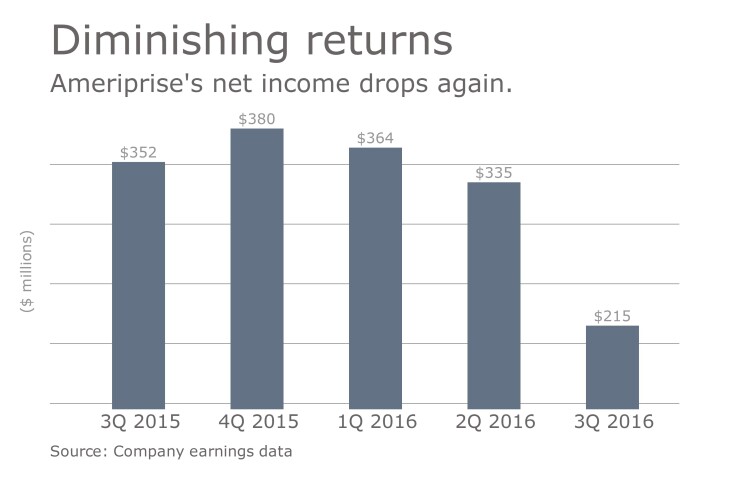In the new fiduciary world, Ameriprise will still offer clients commission-based retirement accounts — bucking a developing trend in which major brokerage firms are dropping commissions in such accounts for fear of lawsuits.
Ameriprise, which is also making changes to its platform, including dropping products and cutting fees, said it would be taking advantage of the so-called best interest contract exemption under the new regulations. That exemption permits firms to continue to do commission-based business with clients in qualified retirement accounts.
"We believe in investment advisory, but it might not be for all clients, based on the fees for it or the account size. There may be other products and services that are more appropriate for them, such as an annuity," Ameriprise CEO Jim Cracchiolo told analysts during an earnings call on Wednesday.

Earlier this month, Merrill Lynch took the opposite approach. The wirehouse, which has more than 14,000 brokers, said it would stop offering clients commission-based retirement accounts. And Commonwealth Financial Network, which has about 1,650 advisers, followed suit this week. In explaining the firm's strategy, CEO Wayne Bloom cited what he called the high likelihood of future lawsuits under the new regulation.

Ameriprise's CEO also said that liability risk is higher under the rule.
The Department of Labor's regulation, due to go into effect next April, has prompted Ameriprise to review the range of products on its platform, which currently numbers in the thousands, according to Cracchiolo.
"We have a wide range today that we feel that, probably under the DOL requirements, we will have to narrow it. We think that will happen across the industry," Cracchiolo said.
From recommending wrong share classes to cherry-picking allocations, these are the pitfalls advisers should avoid.
He added that the firm needs to ensure that products offered are "appropriate for the client."
Under the fiduciary rule, greater product variation could pose a higher liability risk, Cerulli Associates said in a report issued in September. The research firm said it anticipated that firms would increasingly adopt cookie cutter portfolios and passive investing vehicles while also cutting fees and products in order to be in compliance.
Ameriprise said it spent $7 million on fiduciary compliance during the third quarter, on top of $7 million in DOL-related costs already incurred during the previous period. Cracchiolo said the higher expenses were necessary given that "the timeframe to get this done is pretty short."
M&A OPPORTUNITIES?
Cracchiolo said he saw potential acquisition opportunities for Ameriprise as other firms decide to cease offering certain products or services under the fiduciary rule.
"As they come, we will look at them and evaluate them appropriately. We have the cash and we can get more debt by going to the market," he said. "At the end of the day we will still be a disciplined buyer and we will be looking for what provides strategic value over the long term."
Cracchiolo also expected that some advisers would leave firms that gave up commission business, providing Ameriprise with an opportunity to lure them to its platform.
-
"Optimizing choice for our clients … is critical to how we operate as a firm," CEO James Gorman said during an earnings call where the wirehouse reported net revenue was a record $3.9 billion last quarter.
October 19 -
CEO Wayne Bloom says the threat of lawsuits in the wake of the new regulation prompted the change, which could be a first among IBDs.
October 25 -
After the fiduciary rule was announced, it wasn’t clear how brokerage firms would adapt. Here's why the wirehouse is a standout on its approach to the new regulation, and why one competitor isn't.
October 12 -
The wirehouse, which is embracing the new regulation, is the first to unveil its strategy in depth.
October 6
The Minneapolis-based company reported having 2,047 employee advisers and 7,700 independent advisers as of Sept. 30. The firm's combined headcount was down 11 advisers from the previous quarter.
Commonwealth's CEO said he expected a certain amount of attrition would occur following his firm's decision. Currently, only 10% of Commonwealth's revenues in retirement accounts comes from commissions, said Bloom, who emphasized that the firm would work with its advisers to help them transition their practices to fee-based.
"We're doing everything we can so that the attrition will be nothing," Bloom says. "Is that unrealistic? Perhaps."
Mickey Wasserman, a recruiter in Agoura Hills, California, said it's possible some advisers may switch firms because of their decisions on commissions. However, he thinks that the fiduciary rule will prove to be a "compliance nightmare" for executives.
"I think firms that are going to allow commissionable products right now will retract that," said Wasserman, who expects the industry will end up in the same place about a year after the rule goes into effect.






